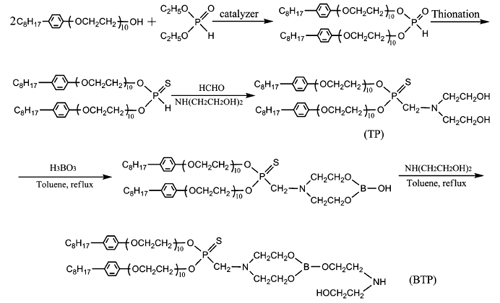Hydraulic fluids are used as the power-transmitting medium for a variety of practical applications. In addition to their main function of converting and transmitting energy, they also play several important roles in the technology of hydraulic power transmission. Due to their extremely low compressibility, excellent lubricity, proper viscosities, good viscosity– temperature properties, and remarkable antirust performance, petroleum oils have long been used as commercial hydraulic fluids. However, their high flammability prevents their application in some hydraulic systems that are subject to extremely high temperature or fire. Therefore, novel low-cost and environmentally friendly alternatives to petroleum oil based hydraulic fluids, with the additional characteristic of non-flammability, are urgently needed.
Researchers at the State Key Laboratory of Solid Lubrication of the Lanzhou Institute of Chemical Physics have demonstrated a multifunctional lubricant additive characterized by an integration of friction- reducing, antiwear, anticorrosion and rust-inhibition functions.
The studies show that the prepared compound BTP can greatly improve the EP property of the base liquid and showed a good antiwear property and friction-reducing performance under an optimum concentration of 2 wt% at all test loads, good anticorrosion and rust inhibiting performance in the base liquid of water– glycol hydraulic fluid.
The prepared compound BTP reacted with the steel surface and generated a protective film mainly composed of phosphate, sulfide, sulfate, organic amine, and B2O3. B existing as alkanolamine borate group can greatly improve the EP, antiwear, and antirust performance of BTP, especially the latter, but it only has a small effect on the friction-reducing and anticorrosion properties.
The work has received support from the National Program on Key Basic Research Project of China (973 Program).
The findings have been published in Tribol Lett (Tribol Lett (2011) 43:235–245).

Outline of processes involved in synthesizing the B-containing thiophosphite derivative (BTP)


